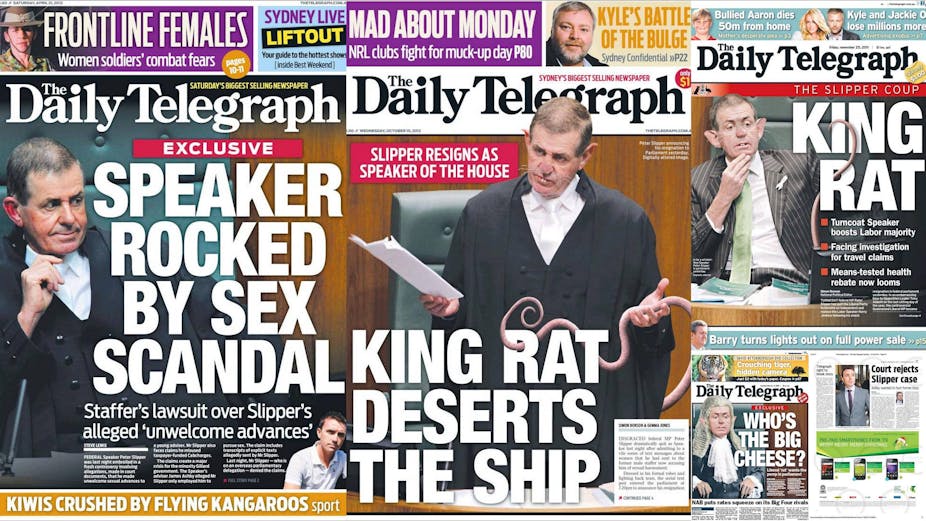The Sydney Daily Telegraph’s reaction to an Australian Press Council ruling that it breached the council’s “fairness and balance” principle raises concerns about the council’s relationship with the big newspaper houses that provide its funding.
The Press Council found that the Daily Telegraph had breached the “fairness and balance” principle in its treatment of the court case involving the former speaker of the federal parliament, Peter Slipper, and a former member of his staff, James Ashby. Ashby, who on Thursday won an appeal to rehear the case, alleged that Slipper had sexually harassed him and had involved him in questionable practices concerning the use of government Cabcharge vouchers.
The original case was heard in the Federal Court before Justice Steven Rares. His judgment noted that on April 4, 2012, a News Limited journalist, Steve Lewis, had sent a text message to Ashby saying: “We will get him”. The judge found that to be a reference to Slipper.
Justice Rares also referred at some length to what he called “collaboration” between Ashby and Lewis. This included his arranging for Ashby to fly to, and stay in, Sydney at News Limited’s expense while conferring with his lawyers about the case.
For all that, Justice Rares found that Lewis had not shared Ashby’s political objectives but had simply been pursuing a story as any journalist might in similar circumstances.
The grounds for complaint
The endeavours of Lewis and other News Limited journalists yielded a large number of stories on the Slipper affair. The Daily Telegraph gave these very prominent treatment. On April 21, 2012, the allegations lodged by Ashby with the court were carried across pages one, two and three.
By contrast, on December 13, 2012, the article reporting the court’s dismissal of Ashby’s action as an abuse of process was carried on page 17.
This drew a complaint from a journalist, Margo Kingston, a one-time Sydney Morning Herald reporter in the Canberra press gallery. She complained that by burying the report of the outcome after giving such prominence to the original allegations, the Daily Telegraph had breached the Press Council’s “fairness and balance” principle.
In upholding the complaint, the council said that while the principle does not necessarily require complete or almost complete fairness or balance, a combination of factors meant that avoiding serious unfairness or imbalance was of special importance in this case. These factors were:
The paper had broken the story in the first place.
Lewis had described the allegations as “among the most serious ever raised” in Australian political history.
The newspaper had prominently reported the allegations and progress of the legal proceedings on many occasions over the ensuing months.
Dismissal of the case raised important questions about Slipper’s decision to stand aside as speaker, a decision that the newspaper had noted at the time came after its revelations of Ashby’s allegations.
Readers were entitled to expect to be informed of such a key development as the dismissal of the proceedings, especially by the newspaper that had given them great prominence.
The Press Council might have added – but didn’t – that Lewis’ activities behind the scenes imposed a particular ethical duty on the newspaper to treat the story fairly.
The council went on to say that the later report did not need to match the prominence and detail of the earlier reports. It expressly disavowed any role in specifying precisely how fairness and balance should have been achieved.
The newspaper hits back
Regardless, the Daily Telegraph stated in its editorial that the adjudication was an attack on freedom of the press. The newspaper said that the council was attempting to dictate to editors the way in which they selected and placed the news in their papers.
This is, of course, the standard reaction of the established newspapers to any attempt at holding them accountable. However, in assessing the Daily Telegraph’s attack on the Press Council’s decision and in particular on its chair, Professor Julian Disney, it needs to be remembered that the council depends for its existence on funding from the newspaper companies. The largest of these by far is News Corp (previously News Limited), which owns the Daily Telegraph. That makes it the largest funder too.
After the collapse last year of the Labor government’s attempt at media regulatory reform, the Press Council is all Australia has by way of a mechanism of accountability for newspapers. With its fate in the hands of the media companies, it is unsettling that its largest funder is so openly hostile to its work. Another News Corp publication, The Australian, has referred to the council as “Disneyland”.
The treatment of this latest adjudication says a lot about the News Corp’s attitude. The Telegraph published it on page 29 under the headline: “Australian Press Council Adjudication No 1573”. How about: “Tele mauled by newspaper watchdog”?
After publication of this article, the Press Council advised that, in accordance with its requirements, the Daily Telegraph published a 180-word summary of the adjudication on page 2.

